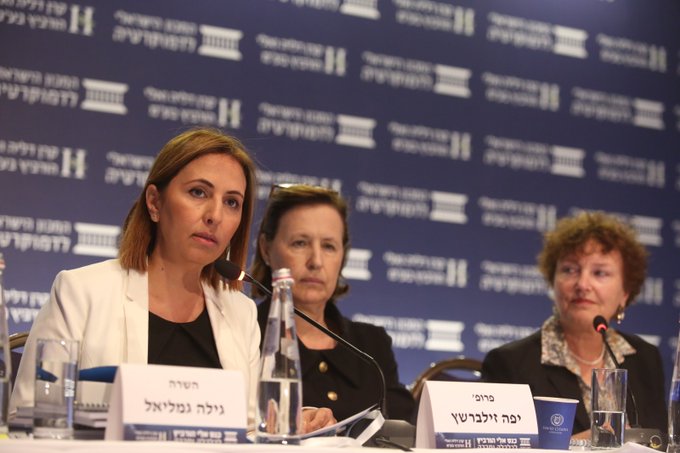How Do We Adapt Our Labor Agreements to the 21st Century?
Eli Hurvitz Conference on Economy and Society – First Day, Second Session

MK Gila Gamliel | Credit: Michal Fattal
MK Gila Gamliel, Minister for Social Equality: “One of my strategic goals is to develop 'smart cities' and to help local municipalities join the digital revolution; In today’s world the geographic distance is no longer an excuse for social inequality”
Yossi Alkovi, President of the Union of Craftsmen and Industrial Workers: “We need a full time Minister of Industry”
Shalom Yehiav, Chairman, The National Union of Israeli Students: “Today’s academic institutions are neither high-quality or appropriate to our generation’s needs; the Minister of Education has to encourage bottom-up processes”
Excerpts:
MK Gila Gamliel, Minister for Social Equality: "If we are smart enough to invest in human capital, education, research and developments we will be able to realize the dream of a ground-breaking and vibrant State of Israel that provides equality for its people. New technologies have entered our life and made a significant contribution to Israel’s economy and society. My goal is to transform our country into an international leader in digital, health and education – without leaving any child behind. One of my strategic goals is to develop 'smart cities' and to help local municipalities join the digital revolution. In today’s world geographic distance is no longer an excuse for social inequality.”
Yossi Alkovi, President of the Union of Craftsmen and Industrial Workers: “One way we can expand the human capital available to our industry is by releasing some young people who do not have matriculation certificates, from military service and instead allowing them to work in our factories. We need a full time Minister of Industry to focus on these issues.”
Dita Bronicki, Founder, Ormat Technologies: “Concerns regarding productivity in comparison with OECD countries and the damage it has caused to employers have been brought to the attention of decision makers and there is unanimous agreement that this must be dealt with. Improving productivity cannot only be achieved by assisting weak population and helping them integrate into the labor market. The key is in upgrading vocational training in three areas: soft and basic skills, work experience and perhaps most importantly– to put the employees at the center.”
Shalom Yehiav, Chairman, The National Union of Israeli Students: “Our generation will need much broader skills in the future. Today’s academic institutions are neither high-quality nor appropriately geared to our generation’s needs. Methods of acquiring knowledge are outdated, lacking in depth of thought and for the most part implement memorization. The lecturers are of high quality but students excel at learning how to use Google Scholar. Challenges facing academic institutions and gaps between universities and colleges are one-way top-bottom processes and will ultimately lead to failure. I call on all students I represent – it is our responsibility to lead the way for our processors, lecturers and universities to succeed. We recommend the Minister of Education to encourage bottom-up processes.”
The Eli Hurvitz Conference on Economy and Society – Israel’s leading economic conference, is taking place today in Jerusalem. In the first session “The Next Government’s Economic Strategy: Where are we Headed?” leaders of Israeli economy came together to discuss long-term strategic issues of importance to the government and the country. The conference is based on research and expert discussions, and brings together a wide range of experts, government officials and business leaders from the public and private sectors.
